 European Parliament elections are being held on 22-25 May, with voting already under way in some countries across Europe. To mark the start of the election, Stuart Brown takes a look at the national campaigns, national polling, and the key domestic issues which are at stake in each of the 28 EU states.
European Parliament elections are being held on 22-25 May, with voting already under way in some countries across Europe. To mark the start of the election, Stuart Brown takes a look at the national campaigns, national polling, and the key domestic issues which are at stake in each of the 28 EU states.
While several predictions have been made as to the eventual composition of the European Parliament, the individual votes which will take place in each EU states between now and Sunday will also have an important impact at the level of domestic politics. This article provides a final overview of each of the 28 national campaigns, including polling on the likely results and some of the key issues at stake in each state. To structure the article, states have been loosely grouped on the basis of their size and location into six different sections, with tables provided showing the latest vote share and seat predictions from PollWatch2014 for each group in turn. An outline of each of the political groups within the European Parliament is available here.
Table 1: Predicted vote share and seats in the 2014 European Parliament elections in the five largest states: France, Germany, Italy, Spain and the UK
[fusion_tabs layout=”horizontal” backgroundcolor=”” inactivecolor=””]
[fusion_tab title=”France”]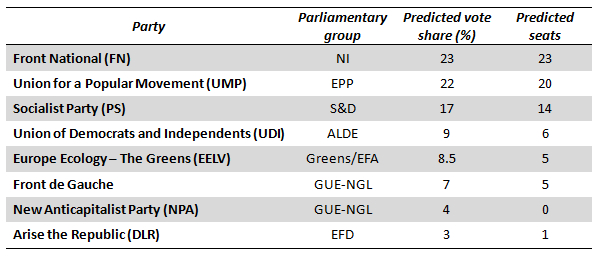
Latest update: average of EP polls from 14 – 16 May; Ifop, OpinionWay, TNS, CSA and Ipsos. For more information on the parties see: Union for a Popular Movement (UMP); Front National (FN); Socialist Party (PS); Front de Gauche; Union of Democrats and Independents (UDI); Europe Ecology – The Greens (EELV); New Anticapitalist Party (NPA); Arise the Republic (DLR).
[/fusion_tab]
[fusion_tab title=”Germany”]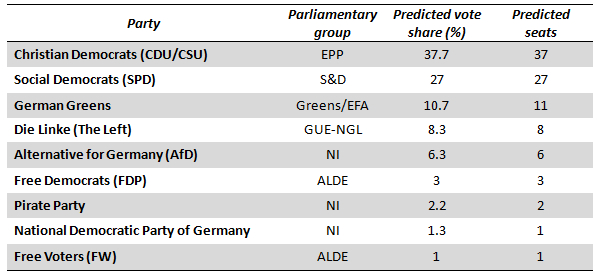
Latest update: average of EP polls from 8 – 16 May; FGW and Infratest. For more information on the parties see: Christian Democrats (CDU/CSU); Social Democrats (SPD); German Greens; Die Linke (The Left); Alternative for Germany (AfD); Free Democrats (FDP); Pirate Party; National Democratic Party of Germany (NPD); Free Voters (FW).
[/fusion_tab]
[fusion_tab title=”Italy”]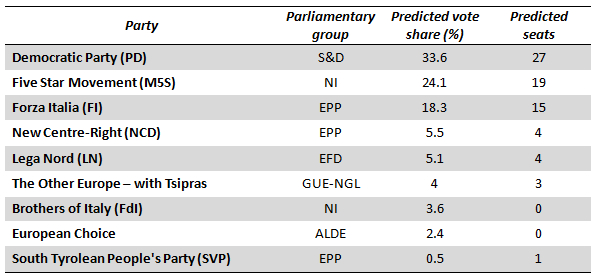
Latest update: average of EP polls from 8 – 9 May; SWG, IXE and DEMOS. For more information on the parties see: Democratic Party (PD); Five Star Movement (M5S); Forza Italia (FI); New Centre-Right (NCD); Lega Nord (LN); The Other Europe – with Tsipras; Brothers of Italy (FdI); European Choice; South Tyrolean People’s Party (SVP). European Choice is an electoral list centred around the Civic Choice party.
[/fusion_tab]
[fusion_tab title=”Spain”]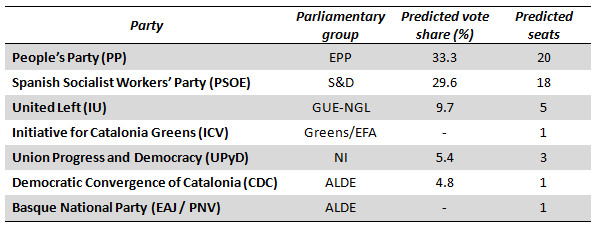
Latest update: average of EP polls from 11 – 19 May; Metroscopia, SigmaDos, Celeste-Tel, and GAD3. Note: United Left and Initiative for Catalonia Greens are running on a joint list and therefore have a joint-vote share shown. A similar format is used for Democratic Convergence of Catalonia and the Basque National Party. For more information on the other parties see: People’s Party (PP); Spanish Socialist Workers’ Party (PSOE); Union, Progress and Democracy (UPyD).
[/fusion_tab]
[fusion_tab title=”UK”]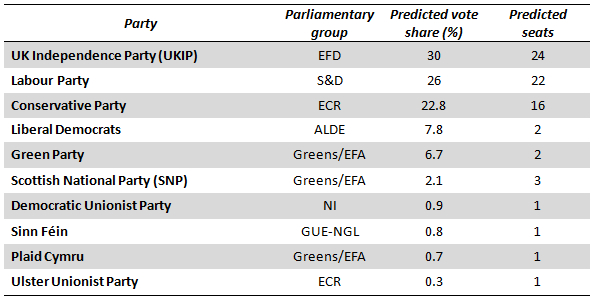
Latest update: average of EP polls from 15 – 18 May; YouGov, ComRes, and ICM. Note: alternative calculations used for Scotland, Northern Ireland and Wales. For more information on the parties see: UK Independence Party (UKIP); Labour Party; Conservative and Unionist Party; Liberal Democrats; Green Party; Scottish National Party (SNP); Democratic Unionist Party; Sinn Féin; Plaid Cymru – Party of Wales; Ulster Unionist Party.
[/fusion_tab]
[/fusion_tabs]
France
In France, Marine Le Pen’s populist Front National are expected to come out with the largest share of the vote, ahead of the country’s main centre-right party, the Union for a Popular Movement. Meanwhile, the Socialist Party of French President François Hollande is predicted to finish a distant third, with 14 seats.
The elections come off the back of municipal elections in March where Hollande’s party suffered their worst result at the local level since 1983. Discontent over the country’s economic situation, in particular the unemployment rate of around 10 per cent, has seen the President’s popularity plummet, and the party is on course to receive a similarly disappointing result to the one it achieved in the last European Parliament elections in 2009. The Front National, in contrast, enjoyed success in the municipal elections and are planning to form a new ‘Eurosceptic Alliance’ in the European Parliament with other Eurosceptic parties, including Geert Wilders’ Party for Freedom in the Netherlands.
Germany
In Germany, the levels of support predicted for the major parties are broadly similar to the results in the German federal election in September 2013, with Angela Merkel’s CDU/CSU holding a solid lead over the SPD, while the Greens and Die Linke sit between 8 and 10 per cent of the vote.
Two developments relating to smaller parties are particularly interesting in Germany. First, while Germany has previously used an electoral threshold in EP elections to limit the numbers of parties entitled to seats, for the 2014 elections this was ruled illegitimate by the country’s Constitutional Court. This has opened up competition to several small parties who would otherwise have had little opportunity to gain representation. This includes the far-right National Democratic Party of Germany (NPD), which has been the subject of controversy in recent years, including several attempts to ban the party from competing in elections. Under the latest prediction, the NPD looks likely to win at least one seat.
Second, the broadly ‘anti-euro’ party Alternative für Deutschland (AfD) looks likely to gain 6 seats in the Parliament – a result which could establish its place in the German party system after the party narrowly fell short of the 5 per cent electoral threshold used in the federal elections in September. The Free Democrats (FDP), who also narrowly missed the threshold in September for the first time in their history, are polling a more disappointing 3 per cent.
Italy
In Italy, the European Parliament elections will be the first election since Matteo Renzi became the country’s new Prime Minister in February. Renzi’s Democratic Party (PD) have been enjoying strong support in the polls since he took over from previous Prime Minister Enrico Letta, and this looks set to continue in the European elections with the party predicted to win 27 seats.
Beppe Grillo’s Five Star Movement, which shocked a number of people with the level of support they received in the Italian parliamentary elections in February 2013, appear ready to build on this success in the European elections, with second place and 19 seats. The party is not currently aligned to any group in the European Parliament and it seems unlikely that this will change given the ‘political outsider’ image which explains at least part of their success. Meanwhile Forza Italia, the party reformed by former Prime Minister Silvio Berlusconi, will comfortably emerge as the country’s largest centre-right party in the election – illustrating that Berlusconi’s political career is still far from over, despite his legal battles.
Spain
Spain was one of the countries worst hit by the Eurozone crisis, with an unemployment rate still around 26 per cent. While this economic situation might appear to make the country a natural candidate for Eurosceptic and populist politics, there has so far been no emergence of the kind of Eurosceptic political movements which are expected to do well in other EU states during the elections. The two mainstream parties, Mariano Rajoy’s People’s Party and the Spanish Socialist Workers’ Party, are still expected to secure the bulk of support in the country. As José Fernández-Albertos has argued, most of the discontent is likely to be expressed through voter apathy, rather than by supporting smaller populist parties.
UK
In the UK, the campaign has been dominated by the rise of UKIP. The latest prediction indicates that UKIP is likely to come out with both the largest share of the votes and the most seats ahead of Labour. The elections are particularly important in view of the upcoming general election in 2015 and the commitment that David Cameron has made to hold an ‘in/out’ referendum on the UK’s membership of the European Union should his party win a majority at the next election. Some commentators have also suggested the European election results could have an impact on the referendum on Scottish independence, which will take place in September. UKIP has traditionally done less well in Scotland than the rest of the UK and a strong UKIP vote might therefore provoke a negative reaction north of the border – although some of the recent opinion polling indicates that it is possible UKIP could also win a seat in Scotland.
Table 2: Predicted vote share and seats in western European states: Belgium, Ireland, Luxembourg, Netherlands and Portugal
[fusion_tabs layout=”horizontal” backgroundcolor=”” inactivecolor=””]
[fusion_tab title=”Belgium”]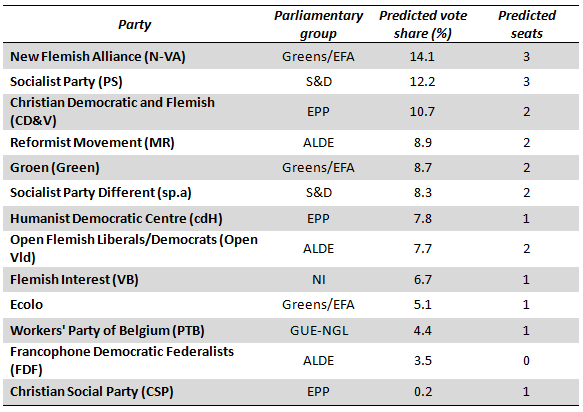
Latest update: average of polls between 28 April – 11 May; RTBF. Note: The Christian Social Party (CSP) represents Belgium’s German speaking community – under Belgian law one seat is reserved for this community. For more information on the other parties see: New-Flemish Alliance (N-VA); Christian Democratic and Flemish (CD&V); Socialist Party (PS); Reformist Movement (MR); Open Flemish Liberals and Democrats (Open Vld); Socialist Party Different (sp.a); Humanist Democratic Centre (cdH); Groen (Green); Ecolo; Flemish Interest (VB); Workers’ Party of Belgium (PTB); People’s Party (PP); Francophone Democratic Federalists (FDF).
[/fusion_tab]
[fusion_tab title=”Ireland”]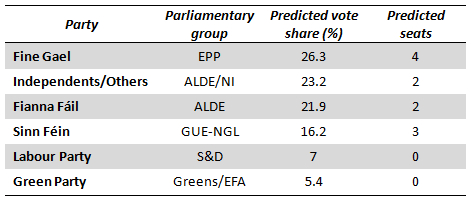
Latest update: average of EP polls from 2 – 14 May; RedC, Millward Brown, and Behaviour & Attitudes. Note: for ‘Independents/Others’ one of the predicted seats will go to a candidate in ALDE and the other is predicted to go to a non-aligned candidate. For information on the parties see: Fine Gael; Fianna Fáil; Sinn Féin; Labour Party; Green Party.
[/fusion_tab]
[fusion_tab title=”Luxembourg”]
Latest update: based on analysis of general election results in October 2013. For more information on the parties see: Christian Social People’s Party (CSV); Luxembourg Socialist Workers’ Party (LSAP); Democratic Party (DP); The Greens.
[/fusion_tab]
[fusion_tab title=”Netherlands”]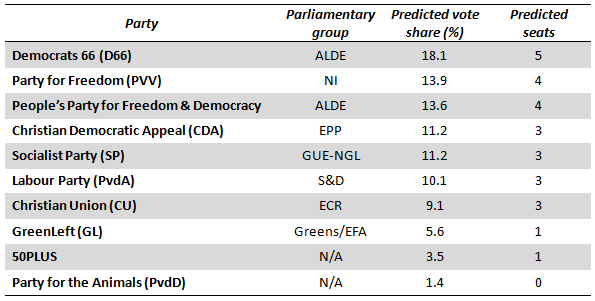
Latest update: average of EP polls from 16 April – 16 May; TNS Nipo. For more information on the parties see: Democrats 66 (D66); Party for Freedom (PVV); People’s Party for Freedom & Democracy (VVD); Christian Democratic Appeal (CDA); Socialist Party (SP); Labour Party (PvdA); Christian Union (CU); GreenLeft (GL); 50PLUS; Party for the Animals (PvdD).
[/fusion_tab]
[fusion_tab title=”Portugal”]
Latest update: based on EP poll conducted on 17 May by Aximage. Democratic Unitarian Coalition is an alliance between the Portuguese Communist Party and the Ecologist Party (the Greens). For more information on the other parties, see: Socialist Party; Social Democratic Party; Left Bloc.
[/fusion_tab]
[/fusion_tabs]
Belgium
Alongside the European elections, Belgium will also be holding regional and federal elections on 25 May – which some commentators have dubbed the ‘mother of all elections’. This can be expected to have a number of different effects on the European vote. First, as Carl Devos has argued, the fact that elections are taking place at all levels of government simultaneously puts political actors under increased pressure, with unsuccessful party leaders and even individual parties unlikely to survive until the next elections in 2019. Second, there may be less of a ‘second order’ effect in Belgium if voters vote for the same party across multiple ballot papers.
In terms of the polling, the Flemish nationalist New Flemish Alliance (N-VA) are predicted to gain the largest vote share and number of MEPs. Success for the N-VA is particularly important in the context of the linguistic divide within Belgium, which resulted in 20 months of negotiations until a new government could be formed after the last federal elections in 2010. The N-VA has moderated its position on Flemish independence since the 2010 elections – it still advocates independence for Flanders in the long term, but the issue is not put forward as an immediate priority. Nevertheless, debates over the linguistic divide within Belgium and the results of the federal elections are likely to overshadow the European elections.
Ireland
Irish European elections have a different dynamic to most of the elections in other states due to the use of the Single Transferable Vote (STV) electoral system. The nature of this system means that the elections tend to be dominated by personalities rather than parties, with polling suggesting that only 35 per cent of voters base their decision on a candidate’s party. As a result it is not uncommon to see candidates fielded who are well-known outside of politics, such as TV presenters or, perhaps most famously, Eurovision winner Dana Rosemary Scallon, who won a seat in the European elections in 1999. Nevertheless, in terms of the polling Fine Gael is currently predicted to emerge with the largest number of seats with four.
The country recently emerged from its bailout programme in December 2013 and the economy has been the key issue in the campaign. The economic situation has not seen the emergence of a strong Eurosceptic party similar to UKIP in the UK, however, and there is still a broad consensus among the mainstream parties over the necessity of EU membership. The European elections have also been scheduled alongside local elections, which may help to encourage turnout: in the 2009 European elections, which were also held alongside local elections, the turnout was fairly high by the standards of other EU states, at just under 58 per cent.
Luxembourg
Luxembourg, as one of the smaller EU states, only has an allocation of six seats. Arguably a more important issue than the national vote is therefore whether former Prime Minister Jean-Claude Juncker can become the next President of the European Commission, having been nominated as the candidate for the European People’s Party. This will be the first occasion on which Luxembourg has not simultaneously held national elections alongside the European elections, following snap elections in October which were brought forward due to Juncker’s resignation.
Netherlands
In the Netherlands, there has been a great deal of speculation about Geert Wilders’ right-wing Party for Freedom (PVV) topping the national poll; however the latest prediction has the liberal and largely pro-EU Democrats 66 leading. Overall, the elections are expected to produce a typically balanced outcome with no one party receiving any more than 20 per cent of the vote. The country’s Prime Minister, Mark Rutte, could see his People’s Party for Freedom and Democracy finish in third place in terms of vote share, although with the same number of seats as Wilders’ party.
The margin between these parties is so small, however, that it is quite possible the PVV could finish as low as fourth place, which would represent an exceptionally disappointing result given the polling lead it held earlier in the year. There are a number of elements contributing to the PVV’s loss in support, including intense controversy created by Wilders during the country’s municipal elections in March, where he led a chant against Moroccan immigrants in The Hague. Another element may be the intention to pursue an alliance with Marine Le Pen’s Front National rather than UKIP and the Europe of Freedom and Democracy (EFD) group. This has prompted criticism from some figures in the party, most notably MEP Lucas Hartong, who refused to take an active role in the PVV’s campaign on the basis that he did not want to share a platform with extremist parties.
Far from being a victory for Euroscepticism, it is therefore quite possible that the results of the Dutch elections will send a broadly pro-EU message, with pro-EU parties – Democrats 66, the People’s Party for Freedom & Democracy (VVD), and the Christian Democratic Appeal (CDA) – topping the poll. Nevertheless, some caution should be exercised in reading broad conclusions about support for the EU into this result. As Stijn van Kessel has argued, the PVV’s support was largely driven by domestic political concerns rather than Euroscepticism: by the same token, a defeat to pro-EU parties would say more about the national debate and a rejection of Wilders’ extremism than the issue of European integration.
Portugal
Portugal was one of the worst hit countries during the Eurozone crisis, but much like neighbouring Spain, the two mainstream parties are still predicted to win the bulk of the country’s seats. The centre-right Social Democratic Party of Prime Minister Pedro Passos Coelho, which has been in government since 2011, is expected to fall short of the opposition Socialist Party by two seats.
The country left its bailout programme only a week before the elections and there have been some broadly positive economic signs in recent months. Nevertheless, unemployment still sits around 15 per cent and there are some doubts over whether claims of a ‘clean exit’ from the bailout programme (i.e. one which does not require further loans) will be achievable in practice, despite statements to this effect by Passos Coelho. Overall, this is expected to translate into a disappointing result for the governing coalition between Passos Coelho’s party and the Democratic and Social Centre – People’s Party. Combined, the coalition parties received over 50 per cent of the vote in the last parliamentary elections in 2011, but in the European elections this is likely to drop to below 35 per cent.
Table 3: Predicted vote share and seats in the Nordic states: Denmark, Finland and Sweden
[fusion_tabs layout=”horizontal” backgroundcolor=”” inactivecolor=””]
[fusion_tab title=”Denmark”]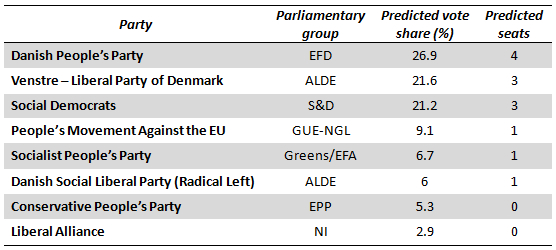
Latest update: Average of polls 6 – 12 May; YouGov, Epinion, Greens, Gallup, A&B, and Voxmeter. For more information on parties see: Venstre – Liberal Party of Denmark; Danish People’s Party; Social Democrats; People’s Movement Against the EU; Danish Social Liberal Party (Radical Left); Socialist People’s Party; Conservative People’s Party; Liberal Alliance.
[/fusion_tab]
[fusion_tab title=”Finland”]
Latest update: average of EP polls from 20 March – 6 May; YouGov and YLE. For more information on the parties see: National Coalition Party; Centre Party; Finns Party; Social Democratic Party of Finland; Green League; Left Alliance.
[/fusion_tab]
[fusion_tab title=”Sweden”]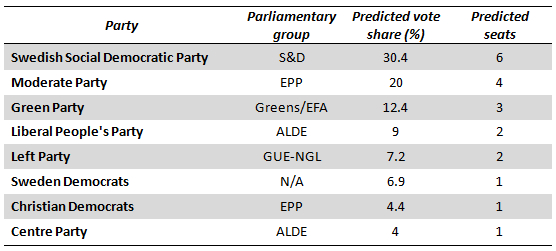
Latest update: average of EP polls from 6 – 12 May; YouGov, Ipsos, Demoskop, and SKOP. For more information on the parties see: Swedish Social Democratic Party; Moderate Party; Green Party; Liberal People’s Party; Left Party; Sweden Democrats; Christian Democrats; Centre Party.
[/fusion_tab]
[/fusion_tabs]
Denmark
The populist Danish People’s Party (DPP) has a significant polling lead over the other Danish parties and is in line to double its number of seats, having won two in the European elections in 2009. There has been some speculation that the party is willing to join the European Conservatives and Reformists (ECR) group in order to increase its influence within the Parliament, however this could prove problematic for some of the other parties within this group, including David Cameron’s Conservative Party in the UK, given the DPP’s strong anti-immigration stance. Elsewhere, the People’s Movement Against the EU seems likely to retain the single MEP it won in 2009, while the Socialist People’s Party, which left the country’s coalition government in January, is predicted to receive less than half of the vote share it gained in 2009, leaving it with only one MEP.
Finland
While Finland has traditionally been regarded as a strongly pro-European country, the success of the Eurosceptic Finns Party has generated significant attention in recent years. The party is predicted to receive a sizeable percentage of support in the elections, although the vote share of just over 20 per cent is broadly comparable with the result it received in the 2011 parliamentary elections (19.1 per cent). In terms of the wider campaign, Finland is similar to Ireland in the sense that the appeal of individual candidates tends to play a large role in European election outcomes due to the use of open party lists, but the latest prediction indicates that the National Coalition Party – the largest party in the current Finnish Parliament – will emerge with four seats, just ahead of the Finns Party on three.
Sweden
The European Parliament elections in Sweden will be held with one eye on the country’s national elections, due to take place in September. The two largest parties in Sweden, the Social Democrats and the Moderates, have therefore had an incentive to increase their active campaigning in comparison to previous European elections, with a disappointing result likely to derail their attempts to build momentum in advance of September’s national vote. As it stands, the polling suggests the Social Democrats will finish as much as 10 per cent ahead of the Moderates and gain two extra seats in the Parliament. Of the smaller parties, perhaps the most notable are the Sweden Democrats, who are expected to join Marine Le Pen’s ‘Eurosceptic Alliance’ if they can gain representation. At present the party are predicted to gain one seat, but they are not far from the margin required to win two seats.
Table 4: Predicted vote share and seats in Central and Eastern Europe: Austria, Czech Republic, Hungary, Poland and Slovakia
[fusion_tabs layout=”horizontal” backgroundcolor=”” inactivecolor=””]
[fusion_tab title=”Austria”]
Latest update: Average of EP polls between 14 – 17 May; Gallup, Hajek, Market and Unique. For more information on the parties see: Social Democratic Party of Austria (SPÖ), Freedom Party of Austria (FPÖ), Austrian People’s Party (ÖVP), The Greens – The Green Alternative, NEOS – The New Austria.
[/fusion_tab]
[fusion_tab title=”Czech Rep.”]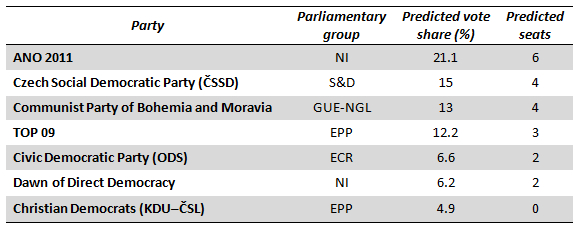
Latest update: average of EP polls conducted from 20 April – 16 May by Herzmann and Sanep. For more information on the parties see: ANO 2011; Czech Social Democratic Party (ČSSD); Communist Party of Bohemia and Moravia (KSČM); TOP 09; Civic Democratic Party (ODS); Christian Democrats (KDU-ČSL); and Dawn of Direct Democracy.
[/fusion_tab]
[fusion_tab title=”Hungary”]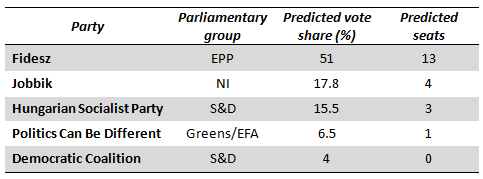
Latest update: average of EP polls from 13-16 May; IPSOS and Nezopont Intezet. Note: Fidesz and the Christian Democratic People’s Party (KDNP) form an alliance. For the other parties see: Hungarian Socialist Party (MSZP); Democratic Coalition (DK); Jobbik; Politics can be Different (LMP).
[/fusion_tab]
[fusion_tab title=”Poland”]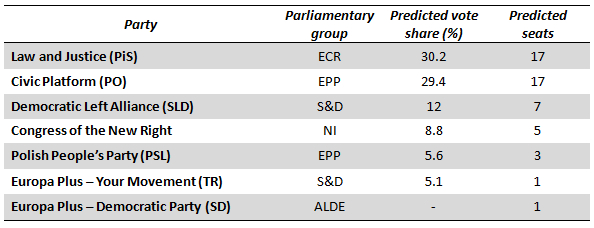
Latest update: average of EP polls from 7 – 14 May; TNS, HH, PPW, and CBOS. Note: Europa Plus is a joint list comprising several parties: the total predicted vote share for the list is shown under “Europa Plus – Your Movement” while the seats for individual parties within this list are also shown. For more information on the other parties see: Law and Justice (PiS); Civic Platform (PO); Democratic Left Alliance (SLD); Congress of the New Right; Polish People’s Party (PSL); Europa Plus – Your Movement.
[/fusion_tab]
[fusion_tab title=”Slovakia”]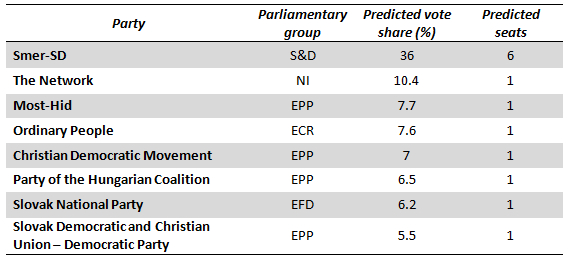
Latest update: average of national polls from 5 May; Polis. Note: The Network is a new party created by Radoslav Procházka. For more information on the other parties, see: Smer-SD; Most-Hid; Ordinary People; Christian Democratic Movement; Party of the Hungarian Coalition; Slovak National Party; Slovak Democratic and Christian Union – Democratic Party.
[/fusion_tab]
[/fusion_tabs]
Austria
The elections in Austria will take place following national elections in September last year. The two mainstream parties in Austria – the Social Democratic Party of Austria (SPÖ) and the Austrian People’s Party (ÖVP) – narrowly maintained enough support in September’s elections to continue their grand coalition. However both parties have persistently been challenged in recent years by far-right and anti-system parties, most notably the Freedom Party of Austria (FPÖ), who have substantially reduced the traditional dominance enjoyed by the SPÖ and ÖVP in Austrian politics. The European elections will be the latest ‘battleground‘ in this respect, with the latest prediction showing that the two mainstream parties are likely to maintain a narrow lead over the FPÖ.
Czech Republic
The Czech Republic held national elections in October 2013, which produced a substantial reshaping of the Czech party system with the new ANO movement, led by Czech businessman Andrej Babiš, finishing only narrowly behind the Czech Social Democratic Party (ČSSD). The key issue in the run up to the European elections is therefore whether ANO can continue its success and establish itself as a permanent feature of Czech politics. The latest prediction would indicate that this is a distinct possibility, with ANO currently leading the polls by over six per cent from the ČSSD. In the 2009 European elections the Civic Democratic Party (ODS) comfortably topped the national vote with over 30 per cent, however the party’s support has collapsed since then, receiving less than 8 per cent in the 2013 elections, and potentially an even smaller vote share in the upcoming European elections.
Hungary
The European elections in Hungary will take place a little over a month since national elections in April. The national elections were won comprehensively by Viktor Orbán’s ruling Fidesz party, which has dominated Hungarian politics since 2010. Given the European elections will take place so close to the national contest, it is no surprise that Fidesz also have an overwhelming lead in the European polls. What is arguably more significant, however, is that the nationalist Jobbik party is expected to gain an extra seat from the three it won in 2009 and finish in second place in terms of vote share. The Hungarian Socialist Party, the main opposition to Fidesz, is expected to finish in third place, losing one MEP from the four it received in 2009.
Poland
In Poland, Law and Justice, who are one of the key members of the ECR group containing the UK’s Conservative Party, were initially expected to come out comfortably ahead in the election after polling consistently higher than their main rival, Civic Platform, over the last year. In recent months, however, this poll lead has narrowed and it now appears that both parties will receive a similar level of support, with 17 seats being predicted for each by PollWatch.
Slovakia
Slovakia held a Presidential election in March, with businessman Andrej Kiska, an independent candidate, winning a shock victory against Robert Fico, the country’s Prime Minister and leader of Smer-SD. Fico’s party has an absolute majority in the Slovakian Parliament following elections in 2012 and has dominated Slovakian politics in recent years (outside of the Presidential election). This is expected to continue in the 2014 European elections, with Smer-SD currently polling a substantial distance ahead of ‘The Network’, a new party created by Radoslav Procházka earlier this year.
Table 5: Predicted vote share and seats in South-East Europe: Bulgaria, Croatia, Greece, Romania and Slovenia
[fusion_tabs layout=”horizontal” backgroundcolor=”” inactivecolor=””]
[fusion_tab title=”Bulgaria”]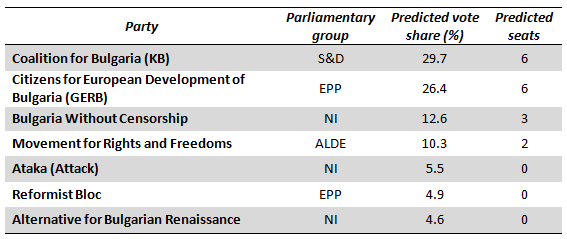
Latest update: average of polls 13 May; Media and IMP. Note: The Coalition for Bulgaria is an alliance between several parties: the Bulgarian Socialist Party (BSP), Party of Bulgarian Social Democrats, Agrarian Union “Aleksandar Stamboliyski”, and Movement for Social Humanism. For more information on the other parties see: Citizens for European Development of Bulgaria (GERB); Bulgaria Without Censorship; Movement for Rights and Freedoms; Alternative for Bulgarian Renaissance; Reformist Bloc; Ataka (Attack).
[/fusion_tab]
[fusion_tab title=”Croatia”]
Latest update: EP poll conducted by Ipsos Puls 16 May. Note: The Croatian Democratic Union Coalition is composed of four parties, of which the Croatian Democratic Union is the largest. The Kukuriku Coalition contains parties from different parliamentary groups, as a result the vote share shown is for the coalition as a whole, but the seat prediction is split between the parties in each group: the Social Democratic Party of Croatia, which is part of S&D; and the Croatian People’s Party – Liberal Democrats (HNS) and Istrian Democratic Assembly (IDS-DDI), which are part of ALDE. For information on the other parties, see: Croatian Sustainable Development (ORaH); Croatian Labourists – Labour Party; and Alliance for Croatia, which is an alliance of several small right-wing parties.
[/fusion_tab]
[fusion_tab title=”Greece”]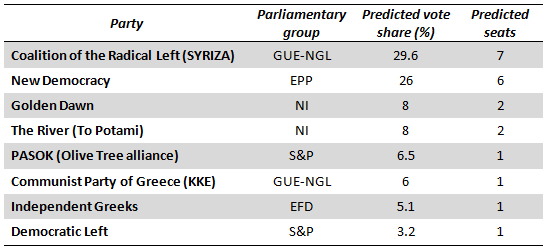
Latest update: average of EP polls from 14 – 15 May; Palmos and Alco. Note: PASOK is contesting the elections as part of the ‘Olive Tree’ alliance, which also includes Agreement for the New Greece, Dynamic Greece and the New Reformers. For information on the other parties see: Coalition of the; Radical Left (SYRIZA); New Democracy; Golden Dawn; The River (To Potami); Communist Party of Greece (KKE); Independent Greeks; Democratic Left.
[/fusion_tab]
[fusion_tab title=”Romania”]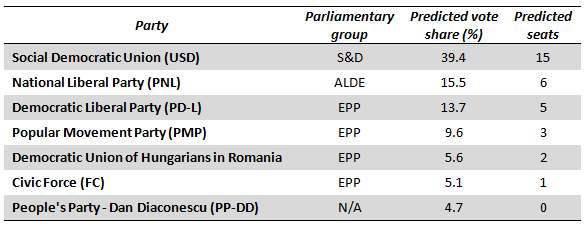
Latest update: average of EP polls from 10 – 12 May; INSCOP and CSOP. Note: Social Democratic Union (USD) is an alliance of the Social Democratic Party (PSD), the Conservative Party (PC), and the National Union for the Progress of Romania (UNPR). For more information on the other parties see: National Liberal Party (PNL); Democratic Liberal Party (PD-L); Democratic Union of Hungarians in Romania (UDMR); Civic Force (FC); People’s Party – Dan Diaconescu (PP-DD).
[/fusion_tab]
[fusion_tab title=”Slovenia”]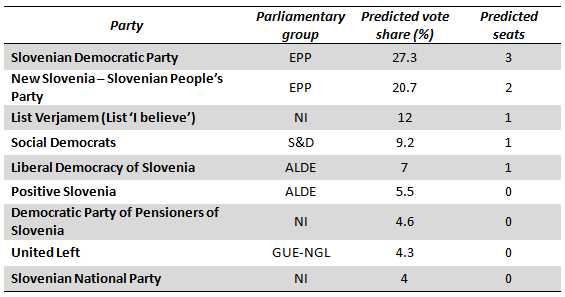
Latest update: average of EP polls from 10 – 13 May; Ninamedia and Episcenter. For more information on the parties see: Slovenian Democratic Party; New Slovenia – Slovenian People’s Party; Social Democrats; Liberal Democracy of Slovenia; Positive Slovenia; Democratic Party of Pensioners of Slovenia; United Left; Slovenian National Party.
[/fusion_tab]
[/fusion_tabs]
Bulgaria
Bulgaria has experienced political instability since 2013, when a widespread protest movement forced the government of Boyko Borisov to resign. The new government which emerged was a fragile coalition between the Bulgarian Socialist Party (BSP) and the Movement for Rights and Freedoms (DPS), which lacks a parliamentary majority (it is firmly supported by 120 out of 240 MPs) and relies on the ultra-nationalist Ataka (Attack) to govern effectively. The European elections will take place in this context, with support polarised between the governing parties and Borisov’s Citizens for European Development of Bulgaria (GERB).
Croatia
The Social Democratic Party of Croatia (SDP), led by the country’s Prime Minister Zoran Milanović, has suffered a substantial drop in popularity in recent months, particularly over the party’s opposition to a proposed referendum on a constitutional amendment to ban gay marriage. However, the SDP have also contributed to their own downfall, with the latest in a long line of problematic decisions being the sacking of a largely popular Finance Minister, Slavko Linić, over allegations of irregularities in tax administration. This was the seventh minister to leave the government since its formation in December 2011, and while Linić has declared he will not make any comments until after the European elections, support for the SDP has nevertheless fallen. The latest prediction bears this out, with the SDP’s coalition currently in second place in the polling behind the right-wing Croatian Democratic Union (HDZ) coalition.
At a broader level, there is little mention in the public discourse of the impact the elections might have on Croatian politics, and enthusiasm toward the EU appears to have faded substantially since the country’s accession in 2013. This was apparent in Milanović’s comments in a recent LSE lecture where he declared that “‘we have a united Europe, and it’s great, but it’s enough”. While such down-to-earth remarks are in stark contrast with the flamboyant promises of other politicians in the region, such as in Serbia, it is unclear whether they will be enough to arrest the slide in support the SDP has experienced.
Greece
Greece was the focal point of the Eurozone crisis and debates over the country’s economy and on-going austerity programme have formed the backdrop to the European elections. As Spyros Economides has noted, the electorate is deeply divided between citizens who support the continued austerity and reform programme – who will mainly vote for the centre-right New Democracy party (ND) – and those opposed to the austerity packages, who will mainly support the radical populism of SYRIZA. In the latest prediction, SYRIZA holds a narrow lead in the polling over New Democracy, with the far-right Golden Dawn in third place.
A further dynamic in the Greek party system is the anti-establishment politics of parties such as SYRIZA and Golden Dawn which targets the ‘old’ parties who held power prior to the crisis, namely New Democracy and PASOK. The latest party to emerge along these lines is ‘The River‘ (To Potami), which was formed by TV presenter Stavros Theodorakis in February. The party is currently polling around 8 per cent of the vote, which would be good enough for 2 MEPs in the Parliament.
Romania
In Romania, the Social Democratic Union alliance between Romanian Prime Minister Victor Ponta’s Social Democratic Party (PSD), the Conservative Party (PC), and the National Union for the Progress of Romania (UNPR) has a strong lead in the polling and is likely to receive around half of the country’s total allocation of seats. The elections will take place in the context of political instability and ahead of a contentious Presidential election in November. Following elections in December 2012, Romania was governed by a coalition, the Social Liberal Union (USL), which incorporated the three Social Democratic Union parties alongside the National Liberal Party (PNL). However the PNL left the government in February, forcing a new coalition involving the Democratic Union of Hungarians in Romania (UDMR) to be formed. The elections could therefore have an important impact on party co-operation in the upcoming Presidential election.
Slovenia
In recent weeks, the Slovenian political arena has been dominated by Zoran Jankovic’s re-election as leader of Positive Slovenia (PS), at the expense of the country’s Prime Minister, Alenka Bratusek, who subsequently submitted her resignation as PM on 5 May. Bratusek fought hard to avoid an international bailout of Slovenian state-owned banks, and has succeeded in this respect; however, this came at the cost of increased taxation and higher foreign government debt, resulting in a fall in popularity. Jankovic took the opportunity to successfully challenge Bratusek’s leadership at the party’s annual congress, thus provoking her resignation, with national elections expected in July.
With such a chaotic lead up to the European elections, it is perhaps not surprising that PS are predicted to have a disappointing result. Indeed, of the current coalition parties, only the Social Democrats are predicted to win a seat. The remaining seats are likely to be shared by Janez Jansa’s Slovenian Democratic Party (SDS), followed by the conservative New Slovenia – Christian People’s Party (NSi) and two minor parties.
Table 6: Predicted vote share and seats in Cyprus, Estonia, Latvia, Lithuania and Malta
[fusion_tabs layout=”horizontal” backgroundcolor=”” inactivecolor=””]
[fusion_tab title=”Cyprus”]
Latest update: EP poll conducted by IMR on 15 May. Note: Several parties are running in coalitions. For more information on the parties, see: Democratic Rally (DISY); Progressive Party of Working People (AKEL); Democratic Party (DIKO); and Movement for Social Democracy EDEK.
[/fusion_tab]
[fusion_tab title=”Estonia”]
Latest update: average of EP polls from 16 April – 17 May; TNS Emor. Note: Indrek Tarand is an independent candidate. For more information on the parties see: Estonian Centre Party; Social Democratic Party; Estonian Reform Party; Union of Pro Patria and Res Publica.
[/fusion_tab]
[fusion_tab title=”Latvia”]
Latest update: EP poll from 28 April; Faktu. Note: Harmony Centre is an alliance of two parties – the Socialist Party of Latvia (GUE-NGL – 2 seats) and the Social Democratic Party (S&D – 1 seat). For more information on the parties see: Harmony Centre, Unity, Union of Greens and Farmers (ZZS), National Alliance (NA), From the Heart of Latvia.
[/fusion_tab]
[fusion_tab title=”Lithuania”]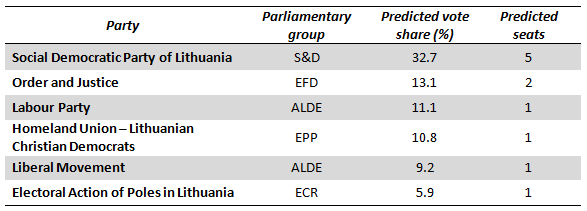
Latest update: average of EP polls from 17 April; Splinter. For more information on the parties see: Social Democratic Party of Lithuania; Order and Justice; Labour Party; Homeland Union – Lithuanian Christian Democrats; Liberal Movement; Electoral Action of Poles in Lithuania.
[/fusion_tab]
[fusion_tab title=”Malta”]
Latest update: based on EP poll conducted on 13 April by Malta Today. For more information on the parties see: Labour Party; Nationalist Party; Democratic Alternative.
[/fusion_tab]
[/fusion_tabs]
Cyprus – Provided by LSE’s James Ker-Lindsay
Cyprus goes to the polls a little over a year after a financial crisis that brought the country to its knees. Although it has made a rapid recovery, and it is now expected that the resulting recession will not be as deep or as prolonged as once feared, there is still a lot of anger at the way in which the EU behaved at the time. Eurosceptic sentiment has risen dramatically. This could well have a major impact on turnout.
The key things to watch out for will be the extent to which the two main parties – the governing centre-right DISY (EPP) of President Nicos Anastasiades and the opposition communist party AKEL (GUE/NGL) – will be affected by the economic downturn. Usually, they each poll around 30-35 per cent each and in the last election they each took two of the island’s six seats. The other two seats went to the two smaller mainstream parties: DIKO and EDEK (both S&D). Other things to look out for are whether ELAM, a Cypriot affiliate of Greece’s Neo-Nazi Golden Dawn picks up votes. Also, this election will see five Turkish Cypriots standing as candidates for the European Parliament. Given that the government has made it easier for Turkish Cypriots to vote, some have asked whether Cyprus may even elect its first Turkish Cypriot MEP. Although this is highly unlikely, it will nevertheless be interesting to see if many Turkish Cypriots do cross the dividing line to cast a vote.
Estonia
Estonia’s European Parliament elections come only a couple of months after the country’s Prime Minister, Andrus Ansip, resigned in March. Ansip’s Reform Party is a short distance behind the Centre Party in the latest PollWatch prediction, but the margin between several parties is too close for any concrete statement to be made about which will come out with the largest share of the vote. The elections will also take place against the backdrop of the Ukraine crisis, which is an important issue in Estonia as a result of the country’s minority Russian population.
Latvia
As with several other countries, Latvia’s European elections will take place in the run up to national elections, due to be held in October. The national elections will be held after the resignation of the country’s Prime Minister, Valdis Dombrovskis, in 2013, and the formation of a new government in January this year. Two of the key issues in the campaign have been the legacy of austerity policies implemented during the financial crisis, and the on-going Ukraine crisis which, similar to Estonia, has particular resonance in Latvia given the country’s significant Russian speaking minority. Dombrovskis’ Unity – which is in coalition with former president Zatlers’ Reform Party, the right-wing nationalist National Alliance, and the Union of Greens and Farmers (ZZS) – is currently a little over 10 per cent behind the Russophone Harmony Centre alliance in the polls.
Lithuania
Lithuania’s European elections will be held alongside the second round of the country’s Presidential election. As such, the European elections are likely to be overshadowed to some extent, with the second round of voting featuring incumbent President Dalia Grybauskaitė and Zigmantas Balčytis of the Social Democratic Party of Lithuania. The country is currently governed by a coalition incorporating the Social Democratic Party of Lithuania, Order and Justice, the Labour Party, and the Electoral Action of Poles, while Grybauskaitė, though formally an independent, is generally supported by the opposition parties.
In terms of the polling, the Social Democratic Party of Lithuania appears to have a strong lead in the European elections, but Grybauskaitė is likely to be successful in the Presidential election. The country’s plan to adopt the euro in January 2015 may have some impact on the campaign, with polling suggesting that most Lithuanians do not support joining the single currency at present. The Order and Justice party have recently called for a referendum to be held on the issue and the Electoral Action of Poles in Lithuania have also expressed scepticism over the plan.
Malta
Finally, in Malta, the country’s entrenched two-party system will likely result in both of the two mainstream parties – the Labour Party, which has been in government since 2013, and the Nationalist Party – splitting the country’s six seats. As Roderick Pace has written, the campaign in Malta has been particularly driven by national issues, with immigration and unemployment forming the bulk of the national debate. Like Ireland, Malta uses the Single Transferable Vote (STV) system and the Labour Party is predicted to have a lead in the vote share, if not seats. The smaller environmental party Democratic Alternative will also compete, but is a long distance from challenging for a seat.
This article was written with the help of LSE’s Tena Prelec and James Ker-Lindsay
Please read our comments policy before commenting.
Note: This article gives the views of the author, and not the position of EUROPP – European Politics and Policy, nor of the London School of Economics.
Shortened URL for this post: http://bit.ly/1nvU7ES
_________________________________
 Stuart Brown – LSE, Public Policy Group
Stuart Brown – LSE, Public Policy Group
Stuart Brown is the Managing Editor of EUROPP. After completing his PhD at the University of Strathclyde, he joined the LSE’s Public Policy Group in July 2012. His research interests include economic integration, regulatory processes and EU decision-making.


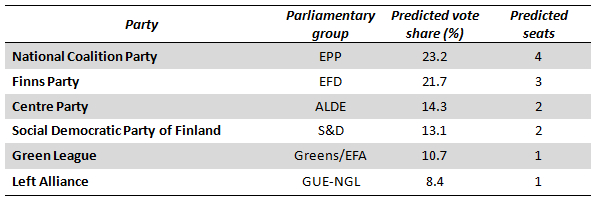


2 Comments